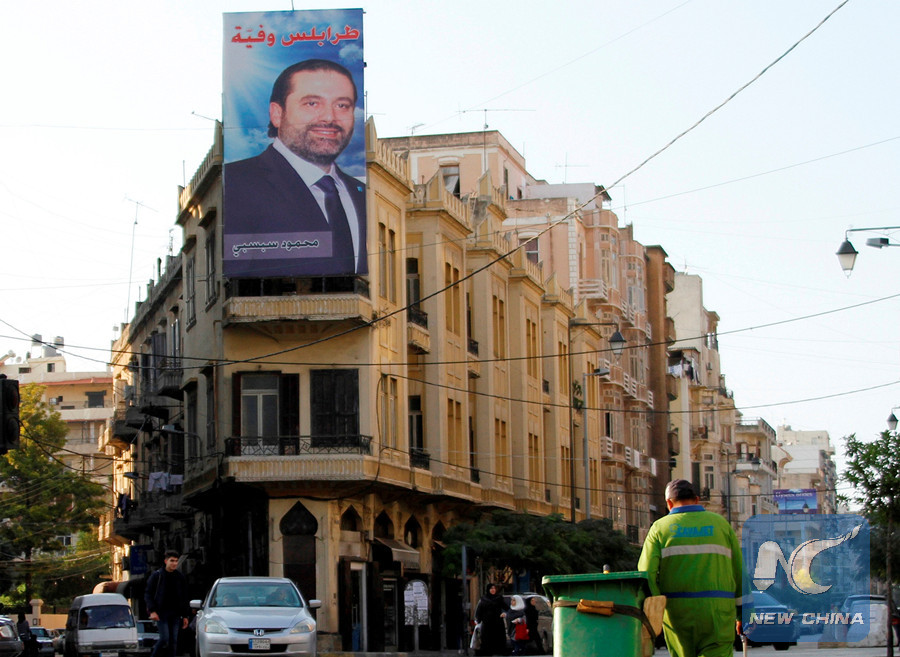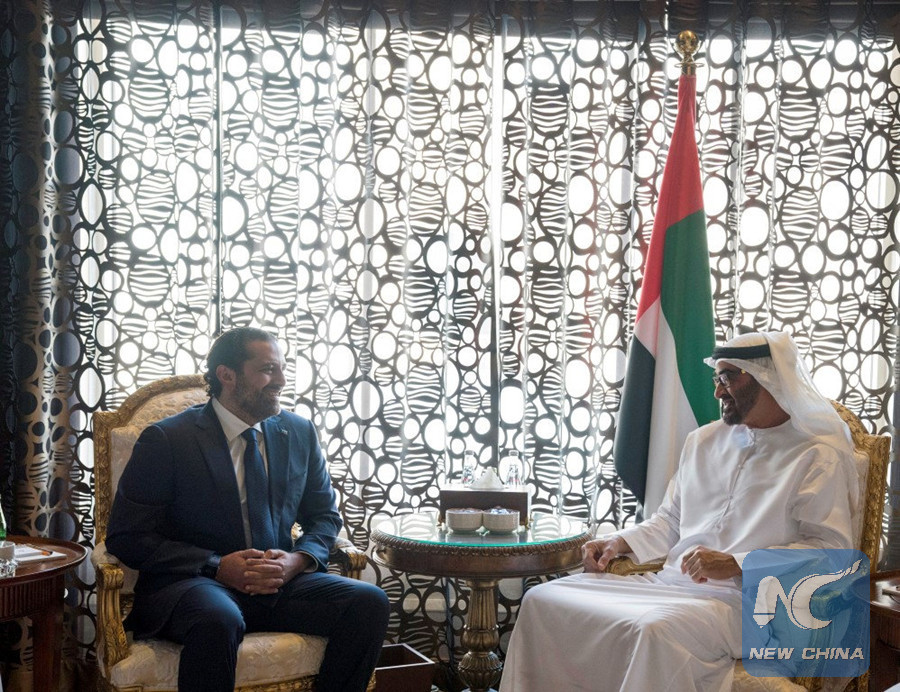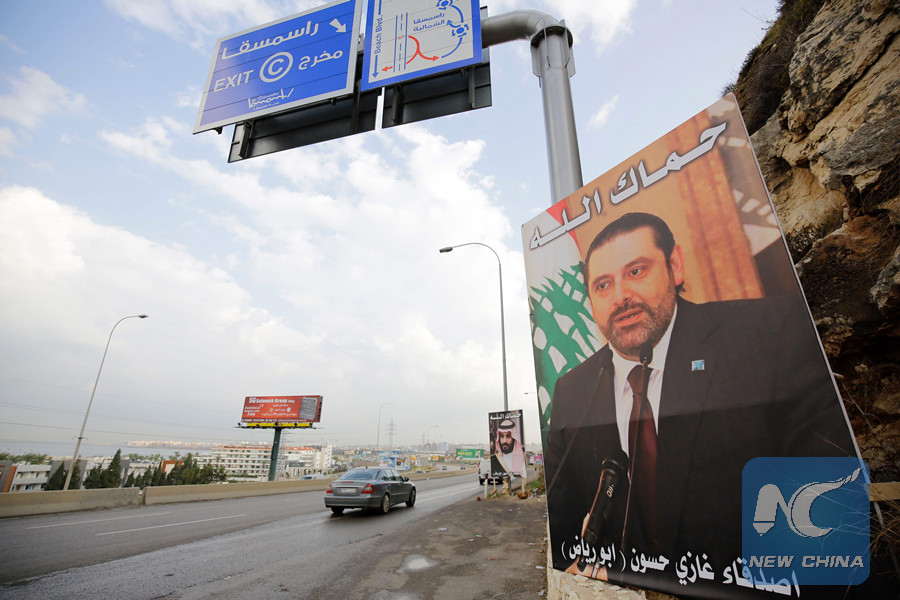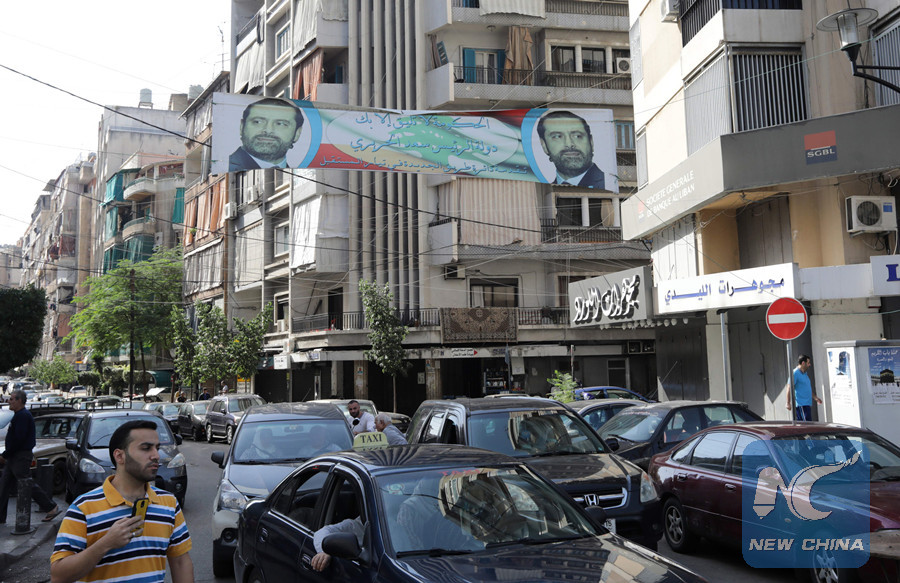
A poster depicting Lebanon's Prime Minister Saad al-Hariri, who has resigned from his post, hangs on a building in Tripoli, northern Lebanon, November 7, 2017. (REUTERS PHOTOS)
by Mahmoud Fouly
CAIRO, Nov. 9 (Xinhua) -- The long-standing conflict between Saudi Arabia and Iran has overshadowed Lebanon following the recent resignation of Lebanese Prime Minister Saad al-Hariri, but it is unlikely lead to a war, analysts said.
Hariri resigned in a televised speech aired from Riyadh on Nov. 4, which is seen as a message from the powerful oil-rich Sunni kingdom to its Shiite rival Iran that is backing Lebanon's Shiite militant and political group Hezbollah.
Hariri blamed Hezbollah and Iran for his resignation, saying he got information about an assassination plot against him. His father, late Prime Minister Rafik al-Hariri, was assassinated in 2005 and an international court is still investigating the tragedy.
POLARIZED STATE
The current political crisis caused by Hariri's move undermines the consensus that has recently been reached in Lebanon after it remained for two years and a half without a president and nine months without a prime minister.
After announcing his resignation from Riyadh, Hariri visited the United Arab Emirates (UAE) and returned to Saudi Arabia rather than returning home, which shows his close coordination with Saudi-led Gulf states.

Abu Dhabi Crown Prince Sheikh Mohammed bin Zayed al-Nahyan meets with former Lebanese Prime Minister Saad al-Hariri in Abu Dhabi, United Arab Emirates, November 7, 2017. (Emirates News Agency WAM/Handout via REUTERS)
On the other hand, Hezbollah, which is represented by several ministers and affiliates in the Lebanese government, is known for its declared loyalty to Iran and for sending militants to fight side by side with the Iranian troops in favor of the Syrian forces of Shiite leader Bashar al-Assad, whose departure has always been a desire of Sunni-dominant Saudi Arabia.
On Thursday, Hezbollah called on Saudi Arabia to stop interfering in Lebanon's domestic affairs. Iran said previously that Hariri's resignation was motivated by the Saudis.
"Neutralizing Lebanon and disassociating it from any regional conflicts or Sunni-Shiite strife is the consensus on which a new Lebanese president has been elected and a new government has been formed," Chant Chinchinian, Lebanese lawmaker and member of the Lebanese Forces Party, told Xinhua from Beirut.
"When this consensus is violated (by Hezbollah), Hariri's resignation is a natural result," he added.

A portrait of the head of the Lebanese Shiite movement Hezbollah, Hasan Nasrallah, is seen on November 5, 2017, in the southern Lebanese village of Adshit. (AFP PHOTO)
Chinchinian believes that the resignation makes Lebanon a symbolic theatre for the regional race between Saudi Arabia and Iran, adding that Lebanon must avoid being dragged into regional conflicts or used as a tool by any state seeking regional expansion.
"Hariri's resignation means that there are new rules for the game, as it is like pulling the rug from under the other party's feet (i.e. Hezbollah) and withdrawing legitimacy from the government. So, the other party needs to reconsider their calculations," said the Lebanese parliamentarian.
"In Lebanon, the meeting of the government in full body is the guarantee for its legitimacy, and this is why the government is given most of the authorities of the president as stated in the 1989 Ta'if Agreement," Chinchinian said.
WAR RULED OUT
On Thursday, Saudi Arabia warned its citizens against travelling to Lebanon and asked those who are in Lebanon to leave the country as soon as possible. It came after Riyadh accused Lebanon of declaring war on the kingdom because of the aggression by the Iranian-bakced Hezbollah in Lebanon.
"I rule out the possibility of any military confrontation in Lebanon as the situation here cannot stand a conflict between two regional giants," said Chinchinian, noting that Lebanon has already suffered a 15-year civil war and the Lebanese are not willing to repeat its woes.
The lawmaker expects rising political tension in the country between Hezbollah and Hariri's March 14 Alliance, but adding it would not lead to confrontation, citing that Hariri's alliance does not possess weapons.
Lebanon's economic and social conditions are also too fragile to be hit by an internal strife between supporters of regional powers or to be a theatre for a tug of war between the Saudis and the Iranians, especially that Lebanon hosts about 1.5 million Syrian refugees and half a million Palestinians.
Ahmed el-Zein, a Lebanese political researcher and a professor of leadership at Beirut-based Modern University for Business and Science, said that all Lebanese people and officials reacted responsibly to Hariri's resignation.
"Although Hariri's resignation is a sign of the influence of the Saudi-Iranian conflict on Lebanon, the issue will not develop into military confrontation," Zein told Xinhua.

A poster of Lebanese Prime Minister Saad Hariri, who resigned last week in a televised speech, hangs on the side of a road with a phrase reading in Arabic, " God protect you" in the northern Lebanese port city of Tripoli on November 9, 2017. (AFP PHOTO)
Zein noted that Lebanon is not only influenced by Saudi Arabia and Iran, but also by other regional states like the United Arab Emirates and Qatar.
Saudi Crown Prince Mohammed bin Salman recently charged that Iran provides the Shiite Houthi rebels in Yemen with long-range advanced missiles to target Saudi Arabia, calling it an Iranian act of aggression against the kingdom.
The Houthi rebels on Saturday fired a long-range ballistic missile on an airport in Riyadh, but it fell and exploded without causing casualties.
Egypt's former ambassador to Beirut Sayyid Abu Zeid does not expect Lebanese parties to engage in a conflict on behalf of Iran and Saudi Arabia, "but this does not prevent a possible sharp political tension among them."
"Hariri's resignation signifies Iran's massive influence on Lebanon," he told Xinhua.
Although Saudi Arabia has warned its citizens against visiting or remaining in Lebanon, the kingdom is unlikely to open another war front while leading exhausting anti-Houthi military airstrikes on Yemen and facing internal issues back home after the recent anti-corruption sweep that led to the arrest of a number of princes and high officials.
Iranian President Hassan Rouhani on Wednesday touted "friendship" between Iran and Saudi Arabia, urging the kingdom to cease what he called their "hostile" policies towards the Islamic republic.
HOPE REMAINS
The way out of the Lebanese political crisis is to return to the consensus over neutralizing Lebanon and disengaging from any regional conflicts, as many experts see, arguing that ball is in the court of Hezbollah.

A picture taken on November 5, 2017 shows cars driving past a banner bearing a portrait of Lebanese Prime Minister Saad Hariri in the capital Beirut a day following the announcement of his resignation. (AFP PHOTO)
"There are some wise parties in Lebanon that try hard to contain the crisis and bridge the gap, seeking the return of Hariri provided that Hezbollah will not interfere in his work," Abu Zeid said, noting that Hezbollah denied exerting pressure on the outgoing Lebanese prime minister.
"There are still a lot of chances to put things back on track in Lebanon," Zeid said.
"The Lebanese understand that any inner discord will negatively reflect on the Lebanese arena, which suffered similar disputes in the 1980s and before the election of the current president and the formation of the current government," he added.

